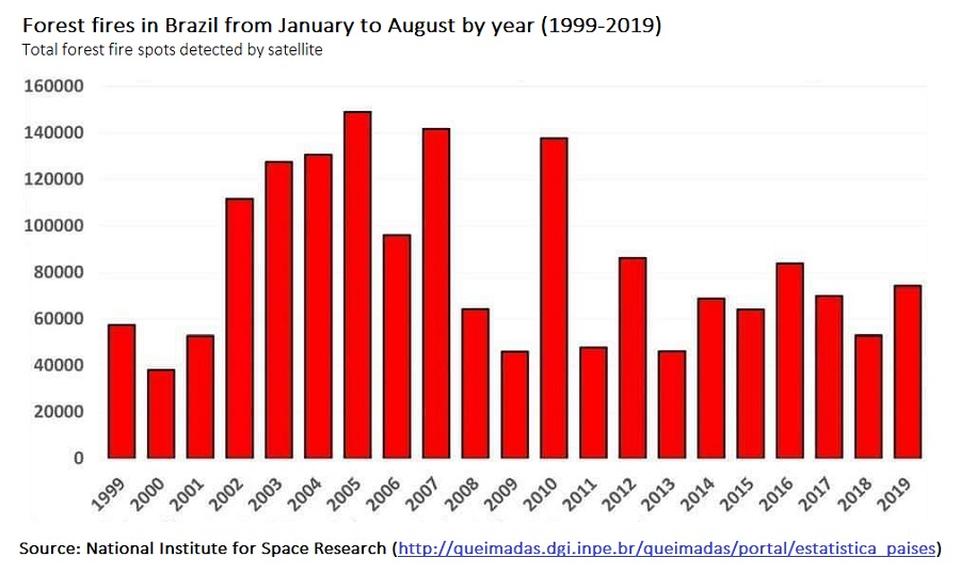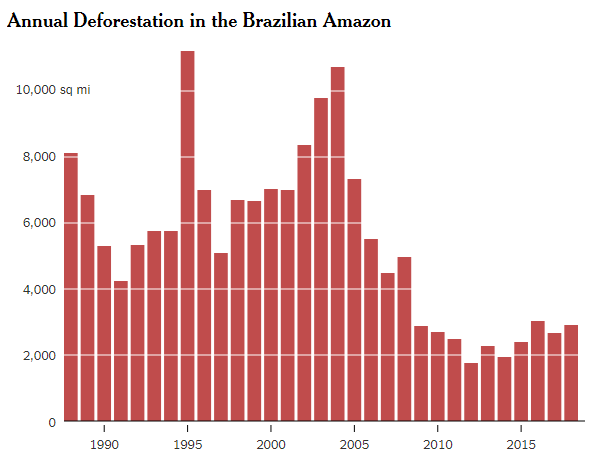Is the Amazon Burning?
The current panic may not be justified, although long-term worries are
The environmental community is presently up in arms about fires in Brazil’s Amazon. The number of fires have dramatically increased over this time last year. A Greenpeace worker said, “This is not just a forest that is burning. This is almost a cemetery. Because all you can see is death.” France’s president Emmanuel Macron tweeted, “Our house is burning. Literally. The Amazon rain forest – the lungs which produces 20% of our planet’s oxygen – is on fire. It is an international crisis,” and spoke of trade sanctions. And NBC News offers the headline, “Amazon wildfires could be ‘game over’ for climate change fight.”
Fortunately, the situation is not so dire. Farmers in the Amazon region — which includes but is larger than the rain forest (in part due to deforestation) — regularly burn their fields to improve the grass for grazing animals, to clear brush before planting, and to control plant and animal pests. In fact, “a large majority of the fires were on land that had already been cleared,” that is, not in the Amazon rain forest. And while the number of fires at this time of year is (according to satellite imagery) greater than in the last 8 years, there are presently fewer of them than in the preceding years. In other words, the number is about average for the last twenty years:

The real problem is not the fires but deforestation, which has increased since 2012. Even here, perspective is important. Although rising, the rate of deforestation remains about one-quarter of what it was at its past peak:

We Westerners (presumably most readers of Legal Planet) likely bristle when Brazil’s right-wing president Jair Bolsonaro describes Macron’s condemnations of the fires as “colonialist mentality” and when his foreign minister responds with calls for “governing of Brazil by Brazilians.” However, they have some basis for these assertions. The foundation of colonialism was control of natural resources by foreign states — in Brazil’s case, more than three centuries of extraction by Portugal. During the global decolonization period of the 1950s and 1960s, Brazil and other developing countries fought strongly for — and got — the international right to exploit natural resources as part of a state’s sovereignty. This is now half of what is arguably the central tenet of international environmental law, captured in the Rio Declaration’s second principle:
States have… the sovereign right to exploit their own resources pursuant to their own environmental and developmental policies, and the responsibility to ensure that activities within their jurisdiction or control do not cause damage to the environment of other States or of areas beyond the limits of national jurisdiction.
This history is why leaders of developing countries such as Brazil often push back against former colonial powers telling them how to manage their internal affairs. (At the same time, Brazil is a party to the Convention on Biological Diversity, under which it has committed to obligations regarding the conservation of its domestic biodiversity, of which the Amazon rain forest is a hotspot.) Furthermore, like Brazil, much of America’s and especially Europe’s agriculture takes place on former forested land. And Amazon expert Dan Nepstad put it in a more recent and local context: “The Brazilians want to know why California gets all this sympathy for its forest fires and while Brazil gets all this finger-pointing.”
I do not intend to diminish the fires’ genuinely harmful impacts on the environment and humans. Yet we need to remain evidence-based and on focused on the real problems, which here is the ongoing deforestation of the Amazon rain forest. Furthermore, I might be wrong about the extent of this year’s fires. If so, please point me to reliable sources in the comments.
Reader Comments
6 Replies to “Is the Amazon Burning?”
Comments are closed.







I love reading legal planet but this is an idiot who wrote this post. If you have 100, and every year some percent goes away then they will be nothing left at the end. There is no reason to not panic just because this year the % loss was smaller than last year.
I think Jesse intends to explain that one aspect of lthe situation is living approach of local people in Amazon rainforest to which most western scholars and policy makers ignore. If I understand correctly Jesse argues that Farmers in Amazon forest use control fires method to get better grass for animal grazing and it is one aspect of fire scenario. He has eloquently framed the Amazon fire issue in North-South debate. And without understanding this sensitive perspective of environmental issues it would be difficult to make any global achievement no matter how much western scholars or policy makers are worried about climate change and other environmental issues.
“we need to remain … focused on the real problems, which here is the ongoing deforestation of the Amazon rain forest.”
… I’ve seen this “20% of the planet’s oxygen” repeated so much over the years, maybe it’s an Al Gore-isum. All I can say is mans folly is only equaled by his gullibility. Long live the algae!
Perhaps you should read this part of your own quote from the Rio Declaration:
“States have… the responsibility to ensure that activities within their jurisdiction or control do not cause damage to the environment of other States or of areas beyond the limits of national jurisdiction.”
While nations should be entitled to control their own natural resources, they are also responsible for harm that they cause to other nations. The fires in Brazil increase GHG emissions, as well as smoke, ash and other harmful air pollutants, and negatively impact habitat for biodiversity throughout the region and across the globe. They also contribute directly to changes in rainfall patterns throughout the region, which extends the length of the dry season and further impacts the rain forest, biodiversity, agriculture and human health within and beyond the borders of Brazil.
Also, the data that you reference show a close correlation between deforestation and the number of fires in Brazil, which have increased by 80% over the last year. While there may have been more fires in the past, Brazil is currently reversing efforts of the last decade to mitigate deforestation. “The destruction of the Amazon rain forest in Brazil has increased rapidly since the nation’s new far-right president took over and his government scaled back efforts to fight illegal logging, ranching and mining.” https://www.nytimes.com/2019/07/28/world/americas/brazil-deforestation-amazon-bolsonaro.html
Brazil’s president Bolsonaro seems to be an ardent admirer of Trump’s profit-for-political-allies-and-cronies environmental policy, but with his own slogan: Make Brazil Burn Again!
–
Yes, Brazil has obligations under the customary international law of preventing transboundary harm, although it is unclear to whom those obligations are owed.